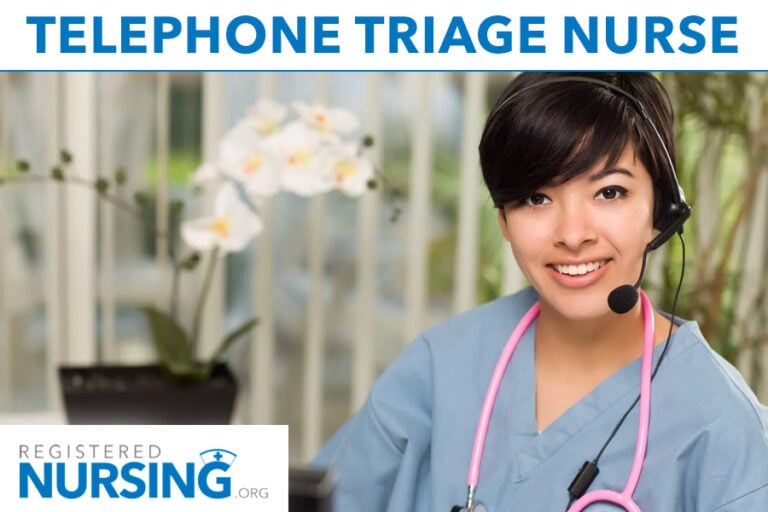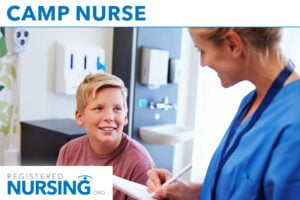Telephone Triage/Telehealth Nurse

What is a Telephone Triage/Telehealth Nurse?
Telephone triage/telehealth nurses, sometimes known as TTNs, assist patients over the phone or via video chat. TTNs often help patients decide whether they need to seek emergency treatment, make an appointment with a doctor, or if they can treat themselves. Telephone triage/telehealth nurses are trained to ask patients highly specific questions to accurately assess their case and refer them to an appropriate health care professional. Telephone triage nurses have the ability to access patients' health information profiles and pertinent charts online, giving them the unique ability to assist their patients remotely. TTNs are especially useful for patients who must travel long distances to reach a medical facility and for those who must struggle to pay for medical services. They also assist doctors in reducing their patient load by remotely guiding patients with minor health problems to save an often-expensive visit to the physician's office. This helps to eliminate overcrowding and reduce long wait times in emergency medical facilities. Most telephone triage/telehealth nursing services are available 24 hours a day, seven days a week, resulting in TTNs working odd hours and night shifts.
How to Become a Telephone Triage/Telehealth Nurse
As a telephone triage/telehealth nurse, it is of paramount importance to possess both exceptional communication abilities and to be able to think on your feet and under pressure. TTNs must be able to listen to patients, assess their situations promptly, and communicate the kind of care they might need.
What Are the Schooling Requirements for Telephone Triage/Telehealth Nurses?
Prospective telephone triage/telehealth nurses must begin their educational journey at nursing college or university where they must first earn either a four-year Bachelor's of Science in Nursing (BSN) or a two-year Associate's Degree in Nursing (ADN). Once this has been achieved, prospective TTNs will need to sit for and pass the NCLEX-RN (Nursing Council Licensure Examination). Once a degree program has been completed and the NCLEX-RN exam has been passed, you can apply to your state RN licensing agencies to become a registered nurse (RN).
Are Any Certifications or Credentials Needed?
Once upon a time, the National Certification Corporation offered a certification in telephone triage nursing. Since 2007, however, telephone triage nursing certification hasn’t been available. Instead, telephone triage/telehealth nursing professionals seeking some form of certification are advised to acquire certification as an ambulatory care nurse. This certification examination is offered by the American Academy of Ambulatory Care Nursing and contains a section that focuses on telephone triage/telehealth. To be eligible to take the examination, an individual must have a minimum of 2,000 hours of nursing experience in a clinical setting.
What Does a Telephone Triage/Telehealth Nurse Do?
Telephone triage/telehealth nurses are strictly responsible for answering phone and video calls from patients to assess their situation and respond accordingly and accurately. Those who aren't familiar with the job might be inclined to think that it's a bit easier than traditional nursing. This couldn't be further from the truth, as working as a telehealth nurse can be extremely challenging. Unlike traditional nurses, telehealth nurses do not have the luxury of being able to examine the patients they're speaking to physically. Regardless, they must make appropriate decisions based only on talking with and sometimes observing the patient via video chat—which can sometimes prove tricky. In situations where a patient does not have a regular doctor, a telehealth nurse may need to refer them to the appropriate local doctors in their region.
Where Do Telephone Triage/Telehealth Nurses Work?
Telephone triage/telehealth nurses may be able to find employment in a sub-specialty field in a number of different settings. The most common place you will find telephone triage/telehealth nurses employed is at dedicated telehealth service centers.
Additional settings that telephone triage/telehealth nurses may find employment include:
- Physician offices
- Hospitals
- Trauma centers
- Crisis hotlines
- Outpatient care facilities
- Poison control centers
What Are the Roles and Duties of a Telephone Triage/Telehealth Nurse?
- Schedule appointments and refer patients to specialists
- Assist and consult with patients over the phone or via video chat services
- Educate patients on different ways to manage their symptoms
- Support medical response teams in bringing patients into the hospital
- Gather necessary information about each patient, including age, weight, height, etc.
- Must be able to assess the severity of a patient's condition quickly and then recommend an appropriate level of care based on the details provided by the patient
Telephone Triage/Telehealth Nurse Salary & Employment
The median annual salary for a registered telephone triage/telehealth nurse is $87,254, as of June 2024, but salaries can range between $73,088 and $107,378 per year. This can, however, vary widely depending on a variety of factors, including state, level of experience, organization of employment, and more.
According to the U.S. Bureau of Labor Statistics, the nursing profession is predicted to grow by 7 percent by 2032. According to the American Nursing Association, because large numbers of currently employed nurses are nearing retirement age, the increasing demand for nurses should continue.
| Average Yearly Salary | |
| Top 10% of Earners | $73,088 |
| Top 25% of Earners | $79,839 |
| Median | $87,254 |
| Bottom 25% of Earners | $97,788 |
| Bottom 10% of Earners | $107,378 |
Telephone Triage Nurse FAQs
Many companies have moved toward hiring telehealth nurses to meet their staffing needs - meaning the nurse can essentially work from anywhere. Given the virtual nature of telehealth, the nurse must have access to high-speed internet, specialized software programs accessing the employer’s network, and possibly telephone service. Time zone differences between the nurse’s current living country and the telehealth employer is a significant consideration as well.
Appropriate internet speeds can be a challenge living overseas. Many countries are still working with broadband or dial-up connections that can be too unreliable for telehealth work. Consistent access to internet can also be a challenge if power supplies are variable. According to statics published by Internet World Stats, only 54% of the world has access to online web systems.
Companies hiring nurses for at-home telehealth positions require the nurse to have an active and unrestricted license in the state where the company resides or affiliates. Many states participate in the Nurse Licensure Compact, which allows the nurse to provide care in all participating states without obtaining additional licensing.
While Telehealth nursing for American nurses living abroad is technologically possible, individual employers would consider such a hire on a case-by-case basis. Telehealth and at-home nursing services are a relatively new working environment for most companies with varying degrees of employee oversight and interaction requirements.
Telephone triage nurses have a challenging job. Nurses are trained to assess from the second they lay eyes on a patient. A significant part of a head to toe assessment is the initial presentation - what the patient looks like at first glance. Are they alert? What is their skin tone? Do they appear in distress?
Nurses, especially experienced ones, often operate off “gut feelings “ - the nagging feeling that something isn’t right. This presents a challenge when assessing over the phone. When a patient calls and speaks to a triage nurse, the nurse first asks what the main complaint is. From there, he or she asks questions about the complaint while listening to cues from the patient that may point to other health issues. For example, if a patient calls in with a complaint of fatigue, the nurse might pick up on shortness of breath or a cough which could be indicative of a breathing or cardiac issue. This assessment leads the nurse towards a more specific line of questioning.
Many organizations have triage protocols in place to ensure no significant assessment piece is missed. The protocols are developed and refined by clinical staff and are reviewed regularly to ensure they are appropriate and follow current evidence-based practices.
Telephone triage nurses, or telehealth nurses, are nurses who assist and advise patients over the phone. They are extremely helpful in reducing patient care loads for physicians while helping patients avoid potentially high co-pays for doctor or emergency room visits. More importantly, they can decide which service is appropriate for their needs.
While telephone triage nurses have access to electronic medical records, the difficulty lies in not being able to visualize the patient. Nurses are trained to assess patients from the moment they lay eyes on them. Much of a nurse's assessment comes from non-verbal cues. For example, a patient may say he is feeling tired lately, and light headed. A nurse can check for mottling or cyanosis, and deduce there may be a respiratory or cardiac issue going on. This can be challenging over the phone. A nurse may ask questions, but the patient may not know what to look for.
Many organizations develop protocols for telephone triage nurses to follow which will help collect pertinent data and determine the best service for them- such as home care advice, a doctor visit, or a trip to the emergency room.
While protocols are helpful, nothing beats a nurse's sharp assessment skills and clinical experience. Telephone triage nurses learn to hone listening skills and pick up on other cues and incorporate that into their assessment. For example, let's say a patient calls for the previously mentioned complaint of fatigue and lightheadedness. While asking pertinent questions, the nurse listens for shortness of breath, difficulty completing sentences, slurred speech and mental status changes. The patient may answer all the questions in which home care advice might be indicated, but a nurse's clinical judgment can override a protocol to recommend an ER visit.
Telephone triage can be challenging, but a strong nurse’s critical thinking and decision-making can overcome the challenges of not being able to lay eyes on a patient.
Helpful Organizations, Societies, and Agencies
- American Telemedicine Association
- American Academy of Ambulatory Care Nursing
- American Association of Poison Control Centers








